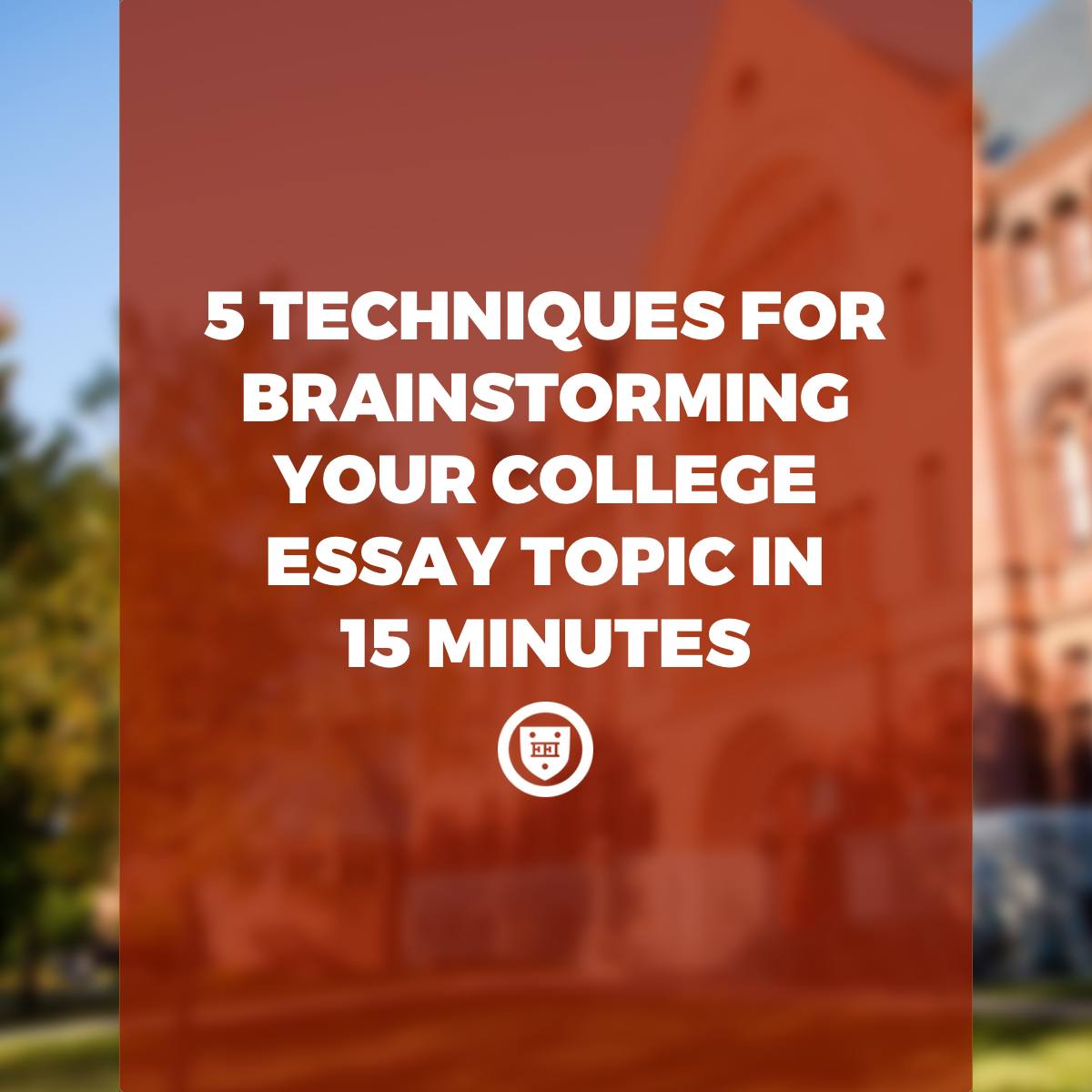5 Techniques for Brainstorming Your College Essay Topic in 15 Minutes
It’s the fall of your senior year of high school. Hopefully by now, you have settled—or are at least close to settling—on the list of colleges and universities you’ll be applying to. Now it’s time to sit down and start in on your college essays if you haven’t already.
For the Common Application, there are seven possible essay prompts to respond to. How do you begin to choose one, and how do you start writing?
The first step is to back up. Before you write anything of value, you must first pre-write.
Pre-writing is the stage at which you are exploring your experiences and ideas, when you begin to come to terms with what your experiences mean, and when you start to think of how they might inform the essay you will soon begin to write.
The first, messiest, least demanding, but perhaps most important stage of pre-writing is brainstorming. Here’s a sample of five brainstorming techniques to get your mind moving and your words flowing as you start to plan your college essays:
1. “Who am I?” Answer This Question by Free Writing (1 minute)
Some college essays include remarkable personal experiences, moving imagery and metaphors, and transcendent moments of insight, but all college essays include words on a page. Start there.
There is a gap between your thoughts and the shape they take on the page. In order to gain clarity on what’s inside your head, it’s vital that you begin by externalizing those ideas—by making them into words on a page, by writing something.
Often, the gap between the mind and the page cripples students. Maybe you know inside that you have compelling, meaningful experiences and ideas to share, but you’re just not sure how to get them out in ink on paper.
Here is where free writing comes in. Sit down with a pen and paper—or an open Word or Google doc on your laptop, if you wish—and set a timer for 1 minute. Write whatever comes into your head in response to the question, “Who am I?” What are the essential facts and stories someone would need to know in order to know you? If you want, begin every sentence with “I am…”
Don’t worry about grammar or mechanical errors. Write with the certainty that no one in the world will ever read what you’re writing.
This is key: you must allow yourself to write at first without an audience in mind. Your college essays are your brief moment to give admission committees a chance to see your essential self. In order for them to see who you are, you need to let that self out at first in an unstructured, unregulated flow of language.
2. Open Up to Yourself (2 ½ Minutes)
The most important first step is breaking down your mental walls, the walls that bottle up your joys and your insecurities on a day-to-day basis. Maybe you did that already in answering the question “Who Am I?” But let’s push things a bit further.
To get at that essential self that you want to represent to colleges and universities, we first need to get the highs and lows out on the page as soon as possible.
Take just one minute to write out what you’re most proud of.
Take another minute to write out what you’re most ashamed of.
Now take thirty seconds to write out your deepest secret. (Don’t worry, you can destroy this document later.)
The point here is not that you will eventually share your deepest, darkest secret with the schools you apply to (though you could). The point is to get you to open up to yourself, to start digging deep so that you eventually get to the seeds of your college essays.
3. Explore Your Home (3 Minutes)
For better or worse, there is no place like home. It’s where most go to feel safe or to feel vulnerable, to relax or to cry. It’s the place we sleep, but it’s also the place we sometimes stay up at night, stirring over whatever bothers us.
Take five minutes to tour your home, either in person or in your mind’s eye. Why? Because our homes are extensions of ourselves.
Home can be the place you currently live, or the place you used to live, or just the place you feel most comfortable. Wherever it is, get in there and feel around:
What does it look like?
What does it smell like? What makes it smell that way?
What’s in the living room? What’s in your bedroom or the place where you sleep?
What about it do you love?
What about it do you hate?
4. Make a List of Superlatives (5 minutes)
Superlatives are the best things, the most interesting things, or the worst things. They are things at their highest degree. Colleges want to know you at your superlative: your most essential self, or your most important identity, experience, or obstacle that defines who you are.
So, get those out on the page, and get ready to open up to yourself. Try answering the questions below. Feel free to write as little as you want—we’re still in the pre-writing stage—but if the mood strikes you, let the words flow as they will.
What has been the greatest moment of your life?
What has been the worst moment of your life? (No one said writing this would be easy.)
What is the most important relationship in your life?
Who is your favorite person to spend time with?
According to you, what is the most important idea, belief, or fact?
What has been your greatest obstacle?
What is the worst problem facing the world today?
What is your favorite hobby?
What makes you the most worried?
What makes you the most excited?
5. Describe the Person You Want to Be (3 ½ Minutes)
Colleges want accomplished applicants, but they don’t want finished products. What’s your vision for your future, ideal self?
Your answer to this question could take many forms, so try writing it out in whatever form comes naturally to you.
If you’re stuck, try exploring these questions to find the answers that fit your vision of your best self:
What is more important to you: financial stability or doing what you love?
If you could be financially secure and skilled at any job, what would that job be?
Do you want to one day have a spouse? Do you want to have your own kids?
In your ideal world, where would you live in ten years? Why?
Conclusion
As the English novelist E.M. Forster once wrote, “How can I tell what I think till I see what I say?” Remember that the purpose of all these exercises is not only to get your brain moving but to get some words on the page, words that will allow you to “see” what you already know. Once you make that knowledge visible to yourself, you’re ready to start drafting the essays that might just propel you into your school of choice.
Stephen P. is a writer and teacher based in Los Angeles. He has taught literature and writing courses at several universities and has taught writing and reading at Elite Prep Los Angeles since 2010.


